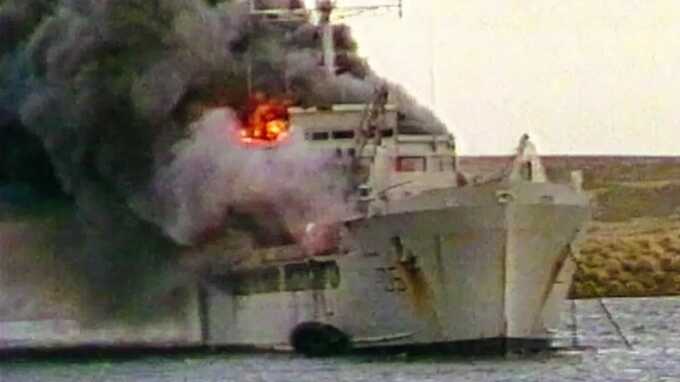
Declassified documents have cleared an army regiment of any blame in the biggest loss of British life during the Falklands War.
Forty-eight crew were killed when the Sir Galahad, an unarmed and undefended supply ship carrying British troops to the Falklands, was hit by Argentinian air force bombs on 8 June 1982.
Thirty-two Welsh Guards died in the attack, but the unit was blamed by some for disobeying orders to leave the boat, making it vulnerable to attack.
Secret files seen by the BBC have now exonerated the regiment and survivors say they now want to know why they were "abandoned" then "betrayed".
"I saw my friends die in the most horrible way and they walked away and concocted all these lies," said Simon Weston, who suffered almost 50% burns in the Sir Galahad attack.
"They made it up, why?"
Files that have been secret for more than 40 years now reveal that despite having no protection or warning about the attack, troops were not ordered to leave the Royal Fleet Auxiliary (RFA) ship.
A 1982 Royal Navy inquiry into the bombing of Sir Galahad and its sister ship Sir Tristram - where eight more people were killed - was held in private and its findings unreleased.
Some excerpts of those confidential documents have been released bit by bit over time but this latest declassification, exclusively seen by the BBC, say “no direct orders were issued” to the 352 Welsh Guards to leave.
“At no time was a direct order to disembark given to Major Sayle by a superior officer," the file states.
Colonel Guy Sayle’s daughter has spoken of how her father was made a "scapegoat" for the disaster, and now the Ministry of Defence (MoD) has said it “in no way blames” the Welsh Guards for the losses that day.
"The document shows very clearly that the inquiry does not believe that an order for the Welsh Guards to disembark was given," said Sir Galahad survivor Crispin Black.
"This contradicts a number of memoirs, it contradicts the accepted narrative, it contradicts what almost everybody believes - the inquiry now accepts that that did not take place," added Mr Black.
The conflict, which took place 8,000 miles (12,874 km) from the British mainland after Argentina invaded the remote UK colony in the South Atlantic, claimed the lives of 255 British service personnel.
Of these, the Welsh Guards suffered the most losses.
Mr Weston, who was one of 595 people on the Sir Galahad that day, said the regiment had "nothing but abuse, we’ve had absolutely no respect at all".
"Until these documents proved our side of the story, the narrative has continued and it ruined lives because of the lies."
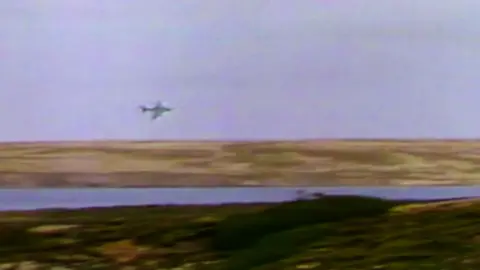
What happened to the Sir Galahad?
The Sir Galahad was bombed towards the end of the Falklands War while attempting to move troops to support the final British assault on Stanley, the island’s capital.
Recently declassified documents - including testimony from Sir Galahad’s captain - revealed confusion, delays and missed opportunities to move them to safety.
The plan was to disembark the troops from the Welsh and Scottish Guards on Bluff Cove – about 15 miles (24 km) from Stanley in Port Fitzroy - to reinforce British positions.
But instead, the ships dropped anchor five miles (8 km) away and the other side of a peninsula at Port Pleasant, to the south of the settlement Fitzroy.
In the afternoon on 8 June 1982 - some six days before the conflict ultimately ended - the Sir Galahad, packed full of ammunition, fuel and hundreds of soldiers, was hit by bombs from Argentine Sky Hawk jets.
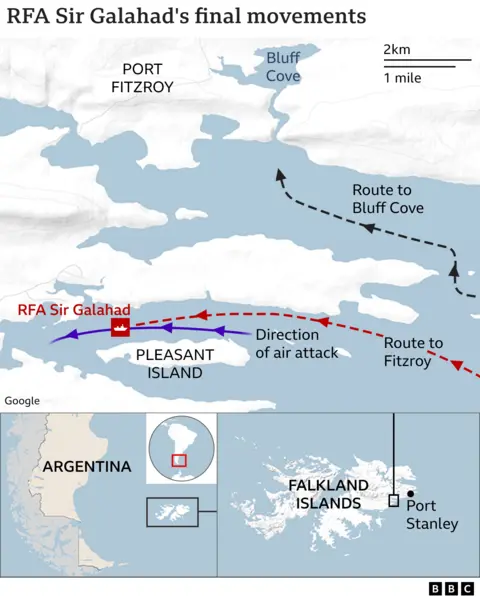
How many died on the Sir Galahad?
The explosion and subsequent fire killed 32 Welsh Guards, 11 other soldiers and five civilian crew on the Sir Galahad.
More than 100 were injured in what became the defining image and most controversial moment of the 10-week war.
Another eight men died on the Sir Tristram while dozens of others were injured, some severely burned.
Part of the inquiry’s findings was meant to remain classified until 2065, but this latest 62-page document has been released after a campaign by former Welsh Guards, their families and Welsh MPs.
Former minister and Conservative Party leader Sir Iain Duncan Smith was among the MPs urging the government to unseal the files to exonerate soldiers who he said have had their "reputations trashed".
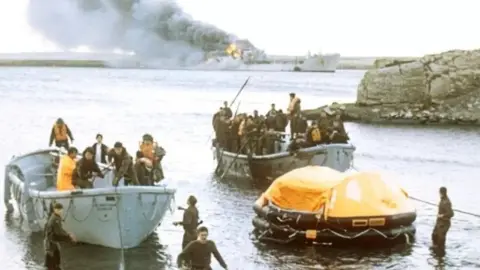
What we now know about Sir Galahad bombing
The previously unsealed documents show Royal Navy command sent Sir Tristram a signal the day before the bombing explaining that Sir Galahad was on its way.
Evidence shows the signal was documented in the Sir Tristram’s signal file, which suggests two of their crew saw it.
The file says as no-one acted on the signal that Sir Galahad was coming, when the vessel did actually arrive there was confusion.
The documents reveal officers “had not been warned of the arrival of the ship, nor of the nature of her cargo”.
"No preparation had been made for the timely off-load of the new arrival," it added.
The person responsible for offloading Sir Galahad’s troops and their supplies to shore was on the Sir Tristram - but he sent one of the two landing crafts away, which would have been crucial for the unloading of troops.
The inquiry files also reveals the remaining landing craft had a defect affecting the lowering ramp on its bow that had been noticed a few days earlier.
This issue was not fixed so it meant the ramp could not be lowered to easily allow troops and their equipment on. So they had to go over the side of the Sir Galahad and climb down ropes, causing huge delays.
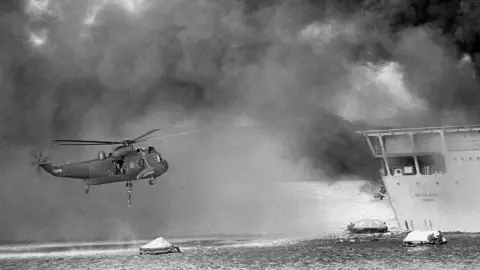
The newly-released file highlights the vulnerability of the unarmed Sir Galahad as, because of the confusion, air defence missiles had not been set up in the hills around Pleasant Sound to provide protection to the vessels from attack.
So the previously confidential findings said soldiers were taken to the wrong place, at the wrong time, on an undefended ship that received no warning about the Argentine attack.
"In a way you feel very briefly good, because at last the truth is coming out," said Mr Black, who became a lieutenant colonel and then intelligence adviser to the prime minister.
"But that fades and the emotions are sorrow, sadness and sometimes suspicion and rage. I cannot see why this file was going to be secret until 2065. Why?
"It’s hugely significant and does remove responsibility from us."
The official inquiry had only previously publicly stated the tragedy was not down to "error" but the "ordinary chances of war".
As recently as last year, the UK government said it was confident in the "findings and recommendations" of the 1982 hearing.
What next for Sir Galahad campaigners?

"All I want is the truth and all of the documents made available, so that we then can say we’ve proven our case," added Mr Weston.
"My best mate on the ship died in front of me. I’m entitled to know, his mother is entitled, his sisters are entitled, his girlfriend at the time and his son who he never saw born is entitled to know the truth about his father.
"We were sacrificed. It’s like tying a goat to a stake and waiting for the tigers to arrive. We couldn’t get off the ship.
“We are all entitled to know why we’ve been abandoned. Why we were betrayed by the decision making of the day."
Defence Minister Andrew Murrison and the UK government has now insisted the Welsh Guards “were not to blame” for their part in the Sir Galahad disaster.
In a letter which accompanies the new documents, Dr Murrison said: “I would like to reassure the Welsh Guards and their families that the Ministry of Defence in no way blames them for the tragic loss”.
“On the contrary, the service and sacrifice of those on board Sir Galahad will not be forgotten," he said.

Newport East MP Jessica Morden, who helped veterans get the files released, has said the MoD’s exoneration is a "huge relief" to servicemen and the families of those who lost their lives.
"However, it’s a shame these words didn’t come earlier. We continue to seek the release of the remaining documents so that they, and the many others impacted by the events of that day can start to get the closure they deserve.
Mr Weston has said veterans want a "full and final answer” on who is to blame while his former comrade Mr Black said he everyone is "looking for the truth."
"Not just most of the responsibility, all of the responsibility for this disaster rests elsewhere," he said.
"And there’s a key question here, if the Welsh Guards were not responsible for this, who was?"